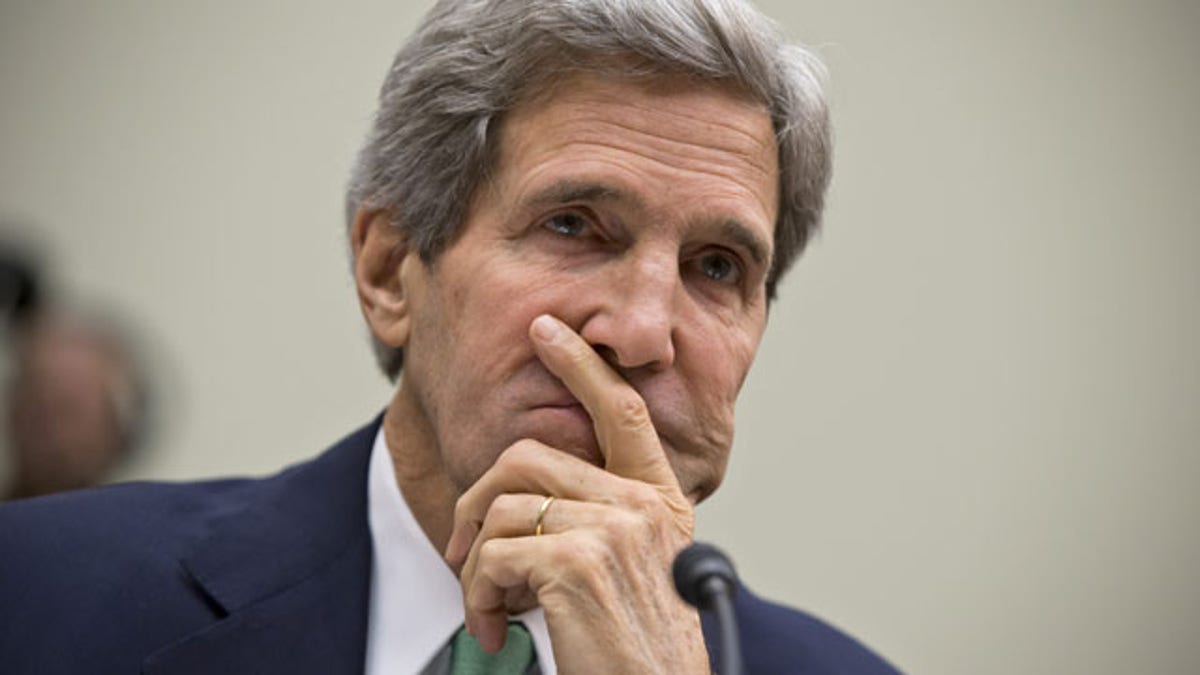
December 10, 2013: Secretary of State John Kerry testifies on Capitol Hill in Washington, before the House Foreign Affairs Committee. (AP Photo)
WASHINGTON – Continuing a furious pace of shuttle diplomacy aimed at securing an elusive Israeli-Palestinian peace deal by spring, U.S. Secretary of State John Kerry arrived in the Middle East on Thursday on his ninth trip of the year.
In closed-door talks with Palestinian President Mahmoud Abbas and Israeli Prime Minister Benjamin Netanyahu on Thursday and Friday, Kerry will be following up on elements of a West Bank security plan, ideas which he unveiled on his most recent visit to the region just last week, and other points of potential progress. Kerry's latest visit comes amid Palestinian unhappiness with the security plan and few, if any, tangible signs of progress.
"This is an ongoing discussion," State Department spokeswoman Jen Psaki said Wednesday, two days after Kerry met with each side's top negotiators in Washington. "Certainly we expect they will talk about security, as they will discuss other issues."
The US hopes by the end of April to reach a final status agreement for Israeli-Palestinian peace, a document that details all the core issues but is less detailed than a full treaty, which would probably take another 6 months to a year to iron out, two senior U.S. officials said. Kerry began his diplomacy on this trip by meeting with Abbas Thursday.
The U.S. hopes, more immediately, to reach a framework accord that outlines and enshrines the principles that the final status agreement would cover, said the officials, who spoke on condition of anonymity because they weren't authorized to discuss the plans by name. The officials insisted the US is not dictating the terms but rather trying to get the two sides to agree on what they should be.
While a modest step, getting a framework by the target date of April 30 would allow them to extend, if needed, the nine-month negotiating period that the two sides agreed to come up with a final status agreement that would lay out specific borders and other details.
A framework accord, the officials said, would be a "logical step" on the path to a final status agreement.
Kerry, along with special U.S. Mideast peace envoy Martin Indyk, met separately and then together for about three hours Monday with chief Israeli negotiator Tzipi Livni and her Palestinian counterpart, Saeb Erekat, Psaki said. Livni and Erekat were in Washington for a Mideast conference in which President Barack Obama, Netanyahu and Kerry participated. Kerry also spoke Wednesday by phone with Netanyahu.
On Monday, though, top Abbas aide Yasser Abed Rabbo said if Kerry finalized a framework accord, he would be breaking a promise to try to negotiate a final agreement in the current round of talks.
The Palestinians are concerned that a framework deal will accommodate very specific Israeli security demands while offering only vague promises to the Palestinians, Rabbo said.
The State Department stressed that the U.S. remains focused on a final deal and not an interim one, although officials acknowledge there may have to be more than one step to achieve a comprehensive agreement.
Security arrangements between Israel and a future Palestine would be central to such a framework. Kerry has argued that progress in negotiations is only possible if Israeli security concerns are addressed first.
The security proposals presented last week to Abbas and Netanyahu include arrangements for the border between Jordan and a state of Palestine.
U.S. officials have refused to discuss details, but Palestinian officials, speaking on condition of anonymity because they were not authorized to discuss the details of the negotiations, say they would give Israel final say at that border for at least 10 years and would also have a military presence in the strip of land next to it, the West Bank's Jordan Valley.
Israeli officials have said they fear militants and weapons could be smuggled into a future Palestine if Israel gives up control over the West Bank-Jordan border. Abbas has said he is willing to accept an international presence there, but not Israeli forces.
The Palestinians want a state in the West Bank, Gaza and east Jerusalem, lands Israel captured in 1967, but are willing to accept minor land swaps in drawing the final border to accommodate some of the settlements Israel has built on war-won land.
Netanyahu has refused to commit to what the Palestinians and most of the international community consider a basic ground rule -- that border negotiations use the 1967 lines as a starting point.
In all, Israel has agreed to release 104 veteran Palestinian prisoners in four stages during the current negotiations, which began in late July and are to conclude in April. Israel has so far released two groups of prisoners.
Kerry wants the last two releases to be combined and be carried out in late January, instead of being done in two installments, the Palestinian officials said.




















